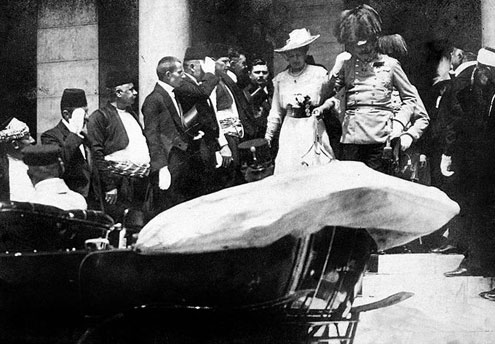This prophecy, from German Chancellor Otto von Bismarck, came in 1888, and he was spot on.
On June 28, 1914, Archduke Franz Ferdinand, the heir to the Austro-Hungarian throne, and his wife, Duchess Sophie, were visiting Sarajevo, the capital of the Austro-Hungarian province of Bosnia-Herzegovina.
Austria-Hungary was a multinational empire in the heart of Europe. The Dual Monarchy, as it was also known, covers land now occupied by 13 countries. The empire's citizens came from multiple ethnic groups and spoke scores of languages; therefore the empire often was pulled in different directions. The Russian Empire supported the protests of the Slav minorities inside Austria-Hungary and saw itself as a protector of Orthodox Christians inside Austria-Hungary.
The archduke was the heir of the House of Habsburg, which presided over this polyglot empire. His house traced its lineage to the ninth century and ruled in the region from at least 1276.

Sarajevo was a center of unrest against foreign rule. Many advisors had advised the archduke to not visit the city.
As the archduke's entourage was driving through the city, a member of the Serbian-sponsored group called The Black Hand threw a grenade at his car. It exploded and hurt people in the vehicle behind the archduke. The archduke and his wife went to visit those injured in the attack. On their way back from the hospital, drivers made a wrong turn, and the motorcade stalled -- right in front of Gavrilo Princip, another member of The Black Hand.
Princip ran up to the archduke's car and shot Duchess Sophie and the archduke. The two died soon after.
The assassination of the heir to the Habsburg throne pushed Europe into crisis, with the Great Powers -- Germany, Russia, France, Great Britain and Austria-Hungary -- reacting to a confusing situation.
Austria-Hungary declared war on Serbia on July 28, 1914. Russia responded July 29 by ordering mobilization, and Germany followed by mobilizing on July 30. Germany declared war on Russia on Aug. 1.
The German strategy was to eliminate the threat from France before turning to take on Russia. France was Russia's ally, and Germany declared war on that country on Aug. 3. Germany's path to France led through Belgium, and the invasion of that country led to Great Britain's declaration of war Aug. 4.
The assassination was the immediate spark that started what became known as the Great War or World War.
Archduke Franz Ferdinand and his wife became the first casualties of a war that claimed the lives of an estimated 18 million people. The Battle of the Somme, fought between July 1 and November 18, 1916, caused about 1.6 million casualties to soldiers on both sides. The Battle of Verdun, fought from February to December 1916, caused more than 700,000 casualties.
The United States declared war on Germany and its allies in April 1917. A total of 117,465 Americans died in the war, with another 204,002 wounded.
The war led to the downfall of the German Empire, the Austria-Hungary Empire, the Russian Empire and the Ottoman Empire. The seeds of the current troubles in the Middle East were sown during World War I.
The Soviet Union and Nazi Germany rose from the ashes of the Great War, and the experience scarred all nations involved and set the tone for the future.
(Follow Jim Garamone on Twitter: @garamoneAFPS)